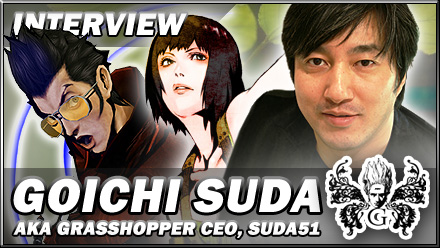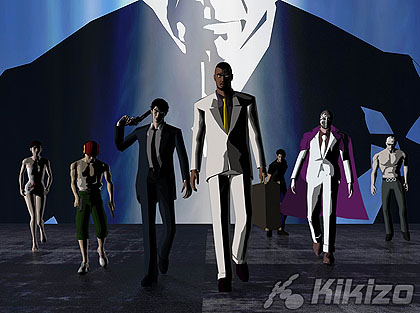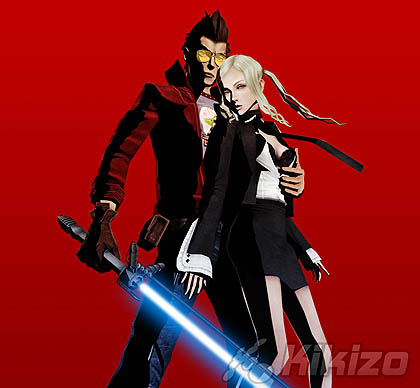Interview: Goichi Suda
We catch up with Grasshoper Manufacture CEO, 'Suda51', to find out about his growing studio's ambitions.

Page: 1 2
Tokyo-based Grasshopper Manufacture, Inc. came to what the illustrious Wikipedia terms "mainstream notoriety" in 2005 with the release of GameCube and PS2 oddity killer7, a heavily stylised action adventure fronted by a wheelchair-bound assassin with seven different personalities, each possessing different traits and abilities. The company had already made a name for itself in its home country for mildly deranged action mechanics, overtly cinematographical direction and psychologically complex storylines, and many of its lesser known projects have proven influential among Japanese developers: it's arguable that Dead Rising's photojournalist premise owes something to Grasshopper Manufacture's 2004 survival horror, Michigan, which casts the player as a TV cameraman investigating a monster-infested town.
Grasshopper followed up killer7 with a string of bottom-line-friendly brand releases, DS RPG Contact and, in late 2006, the fourth-wall-busting No More Heroes, a Wii brawler starring a gamer-cum-hitman equipped with a "beam katana", a monstrous bike named "Schpeltiger" and a bad-ass roster of wrestling moves. One of the most striking things about No More Heroes is its tendency to take potshots at its own medium and entertainment culture in general, referencing other games and films with mischievous regularity. It's a trait many other Grasshopper games share to a lesser degree, and something we're eager to query CEO Goichi Suda (aka "Suda51") about when we bumped into him in Japan recently.
According to Suda, the game's intense self-reflexivity was in many ways rather incidental, arising spontaneously from the developer's desire to pool a lot of different mechanics: "For No More Heroes, the original concept was to try and mix everything from different genres together. And because of the way it was made in the end - with all those different references to other games, there is a kind of hype or buzz around those points too."
Suda refuses to be drawn on the question of the 2010-bound sequel, No More Heroes: Desperate Struggle - "The difference this time is that Travis is fighting for revenge, because... it's secret!" - or on that of sequels to other Grasshopper hits, though he does mention that he's "considering" doing a follow-up to The Silver Case, a murder-mystery adventure which recently joined the PlayStation Store's "PSOne Classics" line-up in Japan. He also keeps his lips sealed about the unnamed, undated horror project Grasshopper is currently at work on for EA, slated for release on Xbox 360, PlayStation 3, Wii and PC, commenting only that he's thinking of creating further games for the two high definition consoles if the project is a success.
Suda is, however, at liberty to talk more generally about Grasshopper's business and development tactics.
Page: 1 2







 Satoru Iwata Video Interview - the late Nintendo president spoke with Kikizo in 2004 as 'Nintendo Revolution' loomed.
Satoru Iwata Video Interview - the late Nintendo president spoke with Kikizo in 2004 as 'Nintendo Revolution' loomed. Kaz Hirai Video Interview - the first of Kikizo's interviews with the man who went on to become global head of Sony.
Kaz Hirai Video Interview - the first of Kikizo's interviews with the man who went on to become global head of Sony. Ed Fries Video Interview - one of Xbox's founders discusses an epic journey from Excel to Xbox.
Ed Fries Video Interview - one of Xbox's founders discusses an epic journey from Excel to Xbox. Yu Suzuki, the Kikizo Interview - we spend time with one of gaming's most revered creators.
Yu Suzuki, the Kikizo Interview - we spend time with one of gaming's most revered creators. Tetris - The Making of an Icon: Alexey Pajitnov and Henk Rogers reveal the fascinating story behind Tetris
Tetris - The Making of an Icon: Alexey Pajitnov and Henk Rogers reveal the fascinating story behind Tetris Rare founders, Chris and Tim Stamper - their only interview? Genuinely 'rare' sit down with founders of the legendary studio.
Rare founders, Chris and Tim Stamper - their only interview? Genuinely 'rare' sit down with founders of the legendary studio. The History of First-Person Shooters - a retrospective, from Maze War to Modern Warfare
The History of First-Person Shooters - a retrospective, from Maze War to Modern Warfare